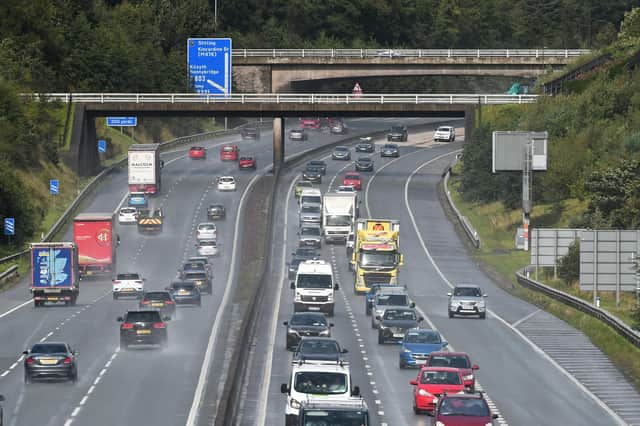Scotland Covid travel bans a 'recipe for confusion'


The sceptical reaction followed First Minister Nicola Sturgeon announcing to MSPs that existing guidance on moving in and out of areas with the greatest number of coronavirus cases would become law from 6pm on Friday.
Police Scotland said there would be no road blocks or routine stopping of vehicles during the three-week ban until 11 December.
Advertisement
Hide AdAdvertisement
Hide AdHowever, critics said confusion would arise because there are 18 exemptions to the travel ban for “essential” purposes, including going to work and caring responsibilities.
A total of 11 local authority areas will move from level three to level four, forcing the closure of non-essential shops and all bars and cafes.
They are Glasgow, Stirling, West Lothian, Renfrewshire, East Renfrewshre, East and West Dunbartonshire, North and East Ayrshire and North and South Lanarkshire.
The travel ban also covers level three areas – Edinburgh, Clackmannanshire, Angus, Dundee, Falkirk, Fife, Inverclyde, North Ayrshire and Perth and Kinross.
East Midlothian and Midlothian will also be affected until they are downgraded from level three to two on Tuesday.
Residents of those areas can travel to airports such as Edinburgh and Glasgow only for essential travel that complies with the exemptions, listed below.
People in other areas of Scotland can transit through level three and four areas to the airports, including for holidays, but Ms Sturgeon has advised against booking them.
Neil Greig, the Scotland-based policy and research director of the IAM RoadSmart motoring group, said: “Drivers must stick to the rules, but with around 18 exemptions allowed for travel, including ‘essential’ shopping and giving blood, this does seem an ongoing recipe for confusion among normally law-abiding people.
Advertisement
Hide AdAdvertisement
Hide Ad"Many people have no choice but to cross council boundaries or may not even know where they are.
"How this change is enforced will be crucial and we have a great deal of sympathy for the police who will have to enforce these regulations on the road alongside all their other priorities.”
Scottish Conservative Holyrood leader Ruth Davidson said: "People across Scotland desperately need clarification on what this travel ban will mean for them.
"For this to be even remotely workable, everyone, especially those living near council boundaries, must know exactly where they can travel and the police need to know precisely how they are expected to enforce it.
"That clarity has to be provided before these restrictions commence on Friday."
Scottish Liberal Democrat leader Willie Rennie said: "These new measures will change the way of life for hundreds of thousands of people so it is essential we fully scrutinise them in a debate and vote on Thursday.
“A travel ban is a serious issue so we need to full understand how this will be enforced.
"Encouraging people to do the right thing is best so people should be told why this is being put into law.”
Advertisement
Hide AdAdvertisement
Hide AdMs Sturgeon said police would only enforce the restriction “as a last resort” where there was a “clear and flagrant breach”.
Police Scotland Assistant Chief Constable Alan Speirs said: "We are asking people to take personal responsibility to do the right thing and remember the purpose of these measures is to aid the collective effort to protect the NHS and save lives by preventing the virus from spreading.
"The policing approach we adopted from the outset of the pandemic will not change.
"Our officers will continue to engage with the public, explain the legislation and guidance, and encourage compliance.
"We will use enforcement as a last resort where there is a clear breach of the legislation.
"The chief constable has said publicly on numerous occasions that we will not be routinely stopping vehicles or setting up road blocks, and that will not change as a result of travel restrictions now being in law.
"However, officers may in the course of their duties come across people who are travelling from one local authority area to another.
"In areas where travel restrictions apply, officers will continue to use the common sense, discretion and excellent judgement they have applied since the crisis began."
Exemptions to the travel ban are:
Advertisement
Hide AdAdvertisement
Hide Ad- work, or to provide voluntary or charitable services, but only where that cannot be done from your home
- school, college, or university where teaching is not provided remotely
- under 18s’ sport (level three areas only)
- essential shopping only where it is not possible in your local authority area – you should use online shopping or shops, banks and other services in your local area wherever you can
- healthcare, social care, childcare and other essential services, including recycling, but only if they are not available in your local area
- provide care or assistance to a vulnerable person
- shared parenting or travel between the two parts of an extended household
- meet a legal obligation, including attending court or satisfying bail conditions, or to participate in legal proceedings
- essential animal welfare reasons, such as feeding a horse or going to a vet
- local outdoor informal exercise such as walking, cycling, golf, or running (in groups of up to six people from no more than two households) that starts and finishes at the same place
Advertisement
Hide AdAdvertisement
Hide Ad- to reach a place to take exercise outdoors around five miles from your local authority area
- travel for weddings, civil partnership registrations, funerals and other “life events” (such as bar mitzvahs and christenings)
- if you are a minister of religion or worship leader, travel to your place of worship
- travel to your normal place of worship (level three areas only)
- travel to give blood at a Scottish National Blood Transfusion Service collection session
- travel to transit through Level three and four areas by road or public transport if your journey begins and ends outside such an area
- travel to move house
- travel to avoid injury/illness/escape risk of harm.